Dec 23, 2024 | Editorial reviews, Interviews
Today, we’re talking with Walter Broach about his book, Spiritual Energy and You
 Tell us something unexpected about yourself!
Tell us something unexpected about yourself!
I'm 86 years old
Why do you write?
It is fun. I like to research stuff and save it so it is easy for me to flesh it out into books.
Where did you get the inspiration for your current book?
I will drop dead soon because I'm old. I'm curious about what happens after death. My next book will be about the material of which we are composed, where it came from, how we got it and what happens to it after death.
What do you enjoy the most about your genre?
I believe I enjoy doing research that interests me the most. I will read anything that comes into my view.
How would you describe your writing process?
I go to my desk and sit down. Then I started messing with my computer by playing a game of Solitaire. Then, I start researching or writing. Google has made the research easy. We don't have to go to the library any more.
What do you think authors have to gain from participating in social media?
It is good for their brain because they get to see lots of viewpoints.
 What advice would you have for other writers?
What advice would you have for other writers?
Write and read. If you want to write, do it. The more you do it, the better you get at it.
How do you select your books’ titles and covers?
I do a short title that is descriptive of the genre of the book and then a longer subtitle telling what the book is about, Then I have someone else do the cover because I want the book to look good.
What's your next step?
To write at least one more book. I'm excited about it. It will be about life before we were born and after we die.
What book do you wish you'd written?
No book not mine. I love reading other peoples stuff, I learn from them.
How do you react to seeing a new review for your book?
I love to read them.
FIND WALTER'S BOOK ON AMAZON
Dec 23, 2024 | Editorial reviews, Interviews
Today, we’re talking with Anthony Wildman about his book, In the Company of Knaves
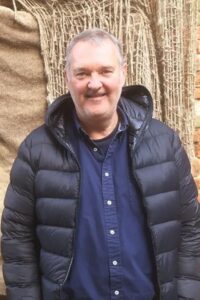 Tell us something unexpected about yourself!
Tell us something unexpected about yourself!
I didn't start writing until after I turned sixty, which was unexpected to me, let alone the rest of the world!
Why do you write?
I often joke that my writing is really only an excuse to do historical research, which is probably half true. But why do I write? Mostly because I have discovered that telling stories, whether true or completely made up, is a lot of fun.
Where did you get the inspiration for your current book?
As the third book in a series about the early life of Shakespeare, it is to some extent built on the two first two novels. But the specific plot in this book was inspired by a few slightly murky historical facts. One was the closure of two of London's major acting companies in 1589, apparently for some kind of transgression against public morality, though the nature of the actual offence is unknown. The other is the well-known enmity that developed between Shakespeare and another writer, Robert Greene, the reasons for which are obscure. The rest of my ideas for the book were hung from those two pegs.
What do you enjoy the most about your genre?
The wonderful thing about history is that it offers an abundance of great stories and intriguing mysteries, both of which combine to create a gold mine for a novelist. And where a historian has to say ‘well, this or this might have happened, or it might not', I can pick the story I like and just tell it. Exploring all those possibilities is great fun.
How would you describe your writing process?
It has evolved over the years. For my first book in the Shakespeare series, I just started with an idea and wrote, letting the story unfold as I went. But for ‘The Diplomat of Florence', my novel about Machiavelli, I had to be much more structured, since I was following very well documented events. More recently I have ended up being a kind of hybrid between being a ‘pantser' and a planner, spending a good deal of time working up the ploy in outline before writing the book itself, but also allowing the narrative to evolve without it being enslaved to the initial plot. Thank heavens I discovered a software package called Scrivener, which makes that kind of writing style very easy.
What do you think authors have to gain from participating in social media?
I do find social media a bit vexing. It often feels as if it is a kind of voracious beast whose appetites can never be satisfied, and if you aren't careful you can end up spending all your time feeding it. Like many, I feel as if its initial promise is slowly being subverted by crass commercialism. But having said all that, there is no denying that it is an important channel of communication if you use it to find the right audience.
 What advice would you have for other writers?
What advice would you have for other writers?
I've often been asked this, and I usually decline to give much advice – I am very conscious that, though I have been at it for six or seven years now, I am relatively new to this game, with much to learn myself. If pushed, I would say that the most important thing for a writer to do is to write! Sounds simple, but creating anything is hard work, and we all put things off that are hard, don't we? But in my experience, just getting down to work and starting pretty soon opens the creative taps, and things start flowing.
How do you select your books’ titles and covers?
I choose the titles of my books to convey as succinctly as possible what the book is about. Anyone who knows anything about Shakespeare, for example, would recognise the words ‘What News on the Rialto?' as a line from The Merchant of Venice, and therefore would have some idea that the book is set in Venice and that it is related to Shakespeare in some way. Similarly, ‘The Diplomat of Florence' tells the reader the setting and general background of the book. So in most respects it is driven by the needs of marketing more than anything else. Much the same is true of my covers. I have an excellent cover designer who comes up with brilliant concepts, but the overall design is governed by marketing. It has to convey what the book is about and where it is set, and it has to stand out on the Amazon page and anywhere else it is advertised.
What's your next step?
I have a few more books lurking in my mind. My next project is likely to be a novel about Napoleon Bonaparte, specifically about his time spent on the island of Elba before he made the fateful decision to return to France and commence the campaign that ended with Waterloo and his final exile to St Helena. It is a curious interlude in his life, and one full of dramatic possibilities (not to mention real life events that, in all honesty, you couldn't make up!). After that I have in mind another series of books set in Renaissance Florence. By the time I've done all that, no doubt a few other ideas will have occurred to me!
How do you react to seeing a new review for your book?
It depends on the review. We all like positive feedback, so an approving review is affirming. But even positive reviews sometimes have little nuggets of criticism that can be a bit jarring when you first see them. I try and take such comments as feedback, unless they are plain silly, in which case I ignore them!
FIND ANTHONY'S BOOK ON AMAZON
Dec 23, 2024 | Interviews, Non Fiction
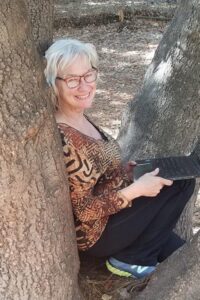 Tell us something unexpected about yourself!
Tell us something unexpected about yourself!
I have an unnatural love for compost. Nothing makes me happier than to see my discards become something fertile and teeming with life.
Why do you write?
Writing is my outlet for channeling the voices that screech in my ear when I'm trying to sleep. It's my sanity saver, giving me an outlet for all the insights, frustrations, and dark humor that I'd otherwise be shrieking into the void.
Where did you get the inspiration for your current book?
This book is a series of essays and stories that reflect my need to process the upsetting truths about the poor condition of Earth's life support systems. Not just climate change, but our fresh water, air, soils, oceans, biodiversity, and more are in bad shape. Why aren't we doing more to save ourselves? Disinformation campaigns play a big part. I also believe that those of us who want to do more wonder if there's anything we can do that will make a difference. So, for every problem I highlight, I decided to showcase a group that's doing something about it, to help inspire us all to do all that we can to save our very life support systems.
What do you enjoy the most about your genre?
I'm not sure I have a genre.
How would you describe your writing process?
Both chaotic and systematic. I sit down to write every morning when my brain is still fresh, come what may. The routine helps me be productive. But the big ideas tend to come while I'm walking, meditating or sleeping—not, in other words, when I sit down at my desk. So, I make notes on my apps or shout them at Alexa in the night, and these become fodder for the next day's writing.
What do you think authors have to gain from participating in social media?
I enjoy following authors who share their trials and tribulations candidly. Not the ones who make it all seem simple but the ones who make me feel like I'm part of a messy, creative tribe. I'm still searching for the best means of connecting with interested readers.
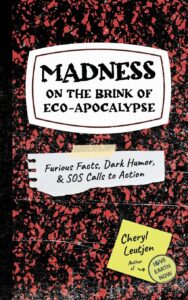 What advice would you have for other writers?
What advice would you have for other writers?
Keep at it. I could not be writing what I am today if not for countless hours spent producing drivel. I also recommend taking a class or joining a writing group to get some new insights and perspectives. I don't mean an MFA program, unless that's meaningful to you—I don't have one. I have, however, gleaned a lot from meeting up with a group of writers, as well as taking a few six-week online classes.
How do you select your books’ titles and covers?
The book title is the very last thing that comes to me. The title Madness on the Brink of Eco-Apocalypse arrived after the entire book had been edited and proofread. My writing is so chaotic, bouncing from one idea to another, that I need that bit of distance after the writing is done to sit back and ponder what the whole thing was all about. I'm fortunate that the cover designers came up with just the right design for both of my books because I think in words, not pictures. But I know what I like when I see it, and I'm thrilled with how the covers turned out.
What's your next step?
This book came fast and furious, given the urgency of the topics. I'm looking forward to writing some lazy blog posts and enjoying the holidays.
FIND CHERYL'S BOOK ON AMAZON
Dec 23, 2024 | Editorial reviews, Interviews
Today, we’re talking with Dana Klisanin about her book, Norbu’s Secret
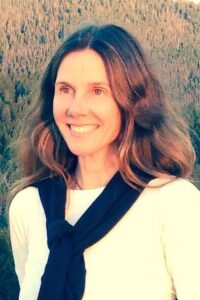 Tell us something unexpected about yourself!
Tell us something unexpected about yourself!
Believe it or not, most of my best story ideas come from my dreams! I like to think of my brain as a 24-hour creativity machine that even works while I’m asleep. Whether it’s through Tibetan dream traveling or simply from dreams I remember, my nighttime adventures spark a lot of what ends up in Chronicles of G.A.I.A. It’s like getting to preview another world while I sleep, and then bringing that magic to life for readers.
Why do you write?
Why do people play music, sing, or dance? I write for the same reason—writing is a soul language. Through my words, I hope to inspire others. With my young adult books, I aim to spark a love for the planet and motivate readers to take action to protect our environment. Writing gives me a way to connect and share dreams and ideas that I hope can make a difference.
Where did you get the inspiration for your current book?
My inspiration came years ago, when I worked with the nonprofit Pachamama Alliance and learned about the Achuar people of the Ecuadorian rainforest. Known as the ‘dream people,' they let their dreams guide their daily lives in ways that are both mystical and deeply practical. I wanted to create a story that would introduce readers to their culture and their role as protectors of the rainforest. Their message of interdependence and respect for nature is crucial for our planet's long-term survival, and I hope readers feel inspired by their wisdom as much as I have.
What do you enjoy the most about your genre?
I love writing sci-fi and fantasy because it gives me the freedom to let my imagination run wild. There are no limits—anything I dream can become part of the story. Through these genres, I can explore big questions and create new worlds that inspire readers to see our own world with fresh eyes. It’s exhilarating to dive into places where magic, technology, and nature intertwine, and where anything feels possible.
How would you describe your writing process?
My writing process is a mix of curiosity, wonder, and a touch of dream-driven magic. I often start by asking my characters questions, letting their answers guide me deeper into the story, and I allow ideas from my dreams to spark new paths. Mornings are my favorite writing time—I begin at my desk, which has magical-looking patterns carved into the front, almost like a portal to other worlds. My laptop may be several years past its prime, but it’s still my gateway to adventure. Tea, almonds, and figs are always nearby, fueling my imagination, and my dog is my faithful timekeeper, reminding me to take breaks for a walk when I’ve lost track of time.
What do you think authors have to gain from participating in social media?
Social media offers authors a powerful way to connect directly with readers, fellow writers, and the larger literary community. It’s a space where we can share our ideas, inspirations, and works-in-progress, creating a sense of anticipation and building an audience even before a book is published. It’s also invaluable for discovering what resonates with readers, receiving feedback, and gathering inspiration from conversations and trends. Beyond promotion, social media allows authors to be part of a dynamic community, which can be energizing and motivating. For me, it’s about more than marketing—it’s about building relationships and sharing a love for stories.
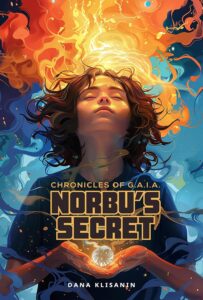 What advice would you have for other writers?
What advice would you have for other writers?
My advice to writers is this: think like molasses. Writing takes patience and persistence. Set aside time each day to write and stick with it. Once the book is written, remember that the editing and publishing process can be slow, and finding the right readers or getting reviews can take time and effort. Write because you love it—those hours, days, and years of creativity are yours, no matter what. Don’t let the public’s reception affect your joy in writing. And if molasses isn’t your thing, think like honey! Embrace the sweetness and let the journey unfold in its own time.
How do you select your books’ titles and covers?
I’m lucky to have a super creative and supportive family when it comes to selecting titles and covers! My sister, Melisca Klisanin, has illustrated two of my books, and we work closely to bring the story’s spirit to life. Once we have a few options, we gather input from other family members—usually over a lively dinner where we debate the pros and cons. Afterwards, my publisher and her team gave valuable feedback, and together, we made the final decision. It’s a collaborative, enjoyable process that makes each book feel even more special.
What's your next step?
My next step is continuing the adventure with book three in the Chronicles of G.A.I.A. series. I’m excited to dive deeper into the characters’ journeys and explore new challenges they’ll face. There are a few surprises and twists that I think readers will love, and I can’t wait to share what’s next for Lexa and her friends!
What book do you wish you'd written?
It's hard to choose just one because I love books across so many genres and age ranges! But if I had to pick for children's literature, two come to mind: “Tuck Everlasting” and “The Golden Compass”. Each of these books invites readers to explore deep questions about life, courage, and the nature of the world—qualities I hope to bring into my own writing.
FIND DANA'S BOOK ON AMAZON
Dec 23, 2024 | Editorial reviews, Interviews
Today, we’re talking with Joseph Bingham about his book, Blue Dragonfly.
 Tell us something unexpected about yourself!
Tell us something unexpected about yourself!
I had a pet black widow spider when I was a young teen. I kept it in an empty peanut butter jar and fed it hornets that found their way into my basement study through a crack in the window. That same make-shift study was also where I kept my insect collection, which was housed in empty cigar boxes, and my cheap microscope, which I used to study protozoa. I grew the one-celled animals in bottles filled with stinky pond water. As you can imagine, I was not a typical young man. My wife says it best by claiming I’m too much like Pedí, the male protagonist in my book—strange, nerdy, and more comfortable talking to the gopher snakes I find and pick up than I am to people. She also says my best friends are the fantasy ones I write about.
Why do you write?
I have always enjoyed reading. In grade school, I walked once a week to our local library and brought home a stack of books. My first fantasy reads were the Wizard of Oz stories by L. Frank Baum. I read all of them. Soon, my reading, besides fiction and fantasy, included nature books, especially those about entomology, herpetology, and paleontology. Deciding to write was an extension of my joy and interest in reading a good story or learning new facts in a book. I loved to make up and tell stories to my children when they were young, and I have continued doing it with my grandchildren. The stories often contain some creature from the natural world, but I like to pepper the tale with a bit of fantasy. After I retired from work, I chose to try to write a story that would include all my interests. But with no experience writing, I started the learning process. It has taken me over ten years to get my story ready for publication.
Where did you get the inspiration for your current book?
I consider myself an amateur entomologist and herpetologist, so writing about insects, frogs, and snakes is natural. They are a big part of my story. The tropical world I created in Blue Dragonfly comes from several things. One of my favorite books is White Waters and Black. I read it for the first time as a teen. It tells the story of a scientific expedition to Bolivia and Brazil in the 1920s. The stories of their adventures in the tropics fascinated me, and I desired to experience South America myself. Later, I was able to live in Brazil for several years and learned Portuguese, which I speak fluently. Tropical diseases are another subject that I have woven into my story. When I went to medical school, I desired to pursue a speciality that would include tropical medicine. However, my wife had twins while we were still in medical school, and suddenly, having a young family did not seem a good option for pursuing a career that might include living and working out of the country. However, after my children were grown, I got additional training in tropical medicine. I went to Africa and the Amazon several times with organizations bringing healthcare to people in need.
What do you enjoy the most about your genre?
I have found the young adult genre to be one in which, depending on the subject matter, middle-graders and older adults can also read and enjoy. I like the diversity of readers. The fantasy in my story is more magical realism, where the tropical world of Pedí and Adací is similar to ours and where the magic or fantasy is woven into the world without overwhelming it.
How would you describe your writing process?
Long! When I first decided to write a book, I talked to my son, who has some writing skills. His advice at the time was to start getting my stories down, even in my worst way, and then figure out the best way to express them later. I began attending writing conferences, purchased books on how to write, subscribed to Writer’s Digest, and got the help of several freelance editors. Blue Dragonfly was written and re-written over a hundred times. Nevertheless, though difficult, the journey was delightful, as I spent time with my fantasy friends.
What do you think authors have to gain from participating in social media?
You are asking the wrong person. I’m an old guy with little experience with Instagram, TikTok, and other social media. I understand it is a great way to communicate with others and share my book, but I will have to learn how to do it.
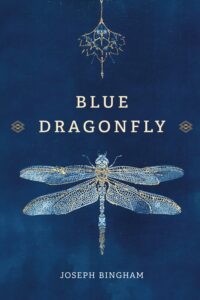 What advice would you have for other writers?
What advice would you have for other writers?
Write about things you are interested in. Find joy in your characters. Keep trying and learning.
How do you select your books’ titles and covers?
The title comes from a mythical insect creature with magical powers that Pedí’s ancestors used to worship. Pedí searches for one all his life. Because of the title, my son suggested I make a cyanotype book cover. The blue of cyanotype art is always fascinating. I started experimenting with cyanotypes, but in the meantime, my wife found a perfect cyanotype dragonfly art piece online. Arianna Guirola created it. Arianna’s art is beautiful, and I immediately knew her dragonfly was what I wanted for my cover. Fortunately, Arianna gave me her permission to use the dragonfly.
What's your next step?
Though Blue Dragonfly has an ending, it opens the door for more adventures. I have already sketched out many ideas and have written parts of the next story, but I have not yet launched into the full writing of the sequel. I have a complete draft of another book, a non-fantasy contemporary story. I may also continue working on it as well.
FIND JOSEPH'S BOOK ON AMAZON
Jul 18, 2024 | Editors' Blog, Interviews, Sci-fi
Today, we’re talking with Alastair Bowman about his book,
Tell us something unexpected about yourself!
I love living in France – and I will get my European passport back in a couple of years!
Why do you write?
To share. And to make people think.
Where did you get the inspiration for your current book?
My passion for economics and social justice.
What do you enjoy the most about your genre?
Scifi gives lots of possibilities to explore new worlds and see ourselves in them.
How would you describe your writing process?
I generally start early. If nothing feels right, then I read and re-write what I've previously written or go and do something else. It has to feel right in the moment even though it will likely be re-written.
What do you think authors have to gain from participating in social media?
Community.
 What advice would you have for other writers?
What advice would you have for other writers?
Keep going, as long as you enjoy it.
How do you select your books’ titles and covers?
The title is whatever feels right. I held a competition for the cover, with the brief to convey jeopardy using the world, a drop of water and barbed wire. The winner added the eye to make a tear, which I think is very effective.
What's your next step?
I am writing the sequel to ‘Creative Destruction' – ‘Icarus Falls'.
What book do you wish you'd written?
I owe a lot to John Steinbeck's ‘The Grapes of Wrath', but for the writing, either Kazuo Ishiguru's ‘The Remains of the Day' or Sebastian Faulk's ‘Birdsong'.
How do you react to seeing a new review for your book?
It's always flattering to have a reader, and even better if they give feedback.
FIND ALASTAIR'S BOOK ON AMAZON
 Tell us something unexpected about yourself!
Tell us something unexpected about yourself! What advice would you have for other writers?
What advice would you have for other writers?
 Tell us something unexpected about yourself!
Tell us something unexpected about yourself!
 Tell us something unexpected about yourself!
Tell us something unexpected about yourself!
 Tell us something unexpected about yourself!
Tell us something unexpected about yourself!
 Tell us something unexpected about yourself!
Tell us something unexpected about yourself!
 What advice would you have for other writers?
What advice would you have for other writers?
